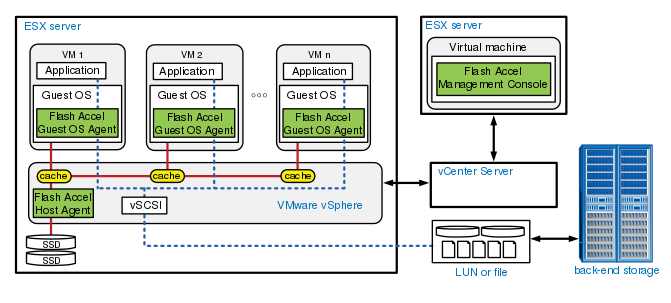In this article I will describe NetApp Flash Accel which makes server-side flash storage available as cache for applications that read from and write to NetApp back-end storage. In a Flash Accel-enabled system, applications write to cache as well as to back-end storage, so that future application reads can be serviced locally from cache. Flash Accel software runs on VMware ESXi hosts and virtual machines.
Flash Accel key features:
- Data coherency - when a backend storage system changes data, it has coherency implications on the server cache.
- Persistent cache - the cache is kept "warm" after a reboot. It remains populated with data from typical read and write activity. Simply put when a VM or server is rebooted, Flash Accel keeps its cache warm and checks / corrects for coherency once the VM or server comes back online.
-
VMware vSphere support (HA, vMotion, DRS, Storage vMotion) - e.g. migration a VM's cache content from one server to another when the VM is vMotioned.
- Support for VMDK, RDM, and direct iSCSI disks.
-
Up to 2 TB of cache per server. Up to 32 cached VMs per server, with no limit on the totalnumber of VMs.
- Support for PCIe cards (must be listed in the NetApp Interoperability Matrix) and server SSDs
- Management of Flash Accel components using Virtual Storage Console (article about it here)
- free for NetApp customers 😉
Flash Accel has the following components:
-
Flash Accel Host Agent - software which manages caching functionality on ESXi hosts. The host agent is installed on each ESXi host with an installed flash device.
- Flash Accel Guest OS Agent - software which manages caching functionality on virtualmachines. The Agent need to be installed on each VM running an application that accesses the cache.
- Flash Accel Management Console (FMC) - browser-based graphical tool used for installation the host and virtual machine software and management caching across the vCenter. This is a virtual appliance (deployed from OVA).
 Flash Accel components
Flash Accel componentsNote: The last download of Flash Accel is March 25, 2014, and the last support date is September 23, 2014.